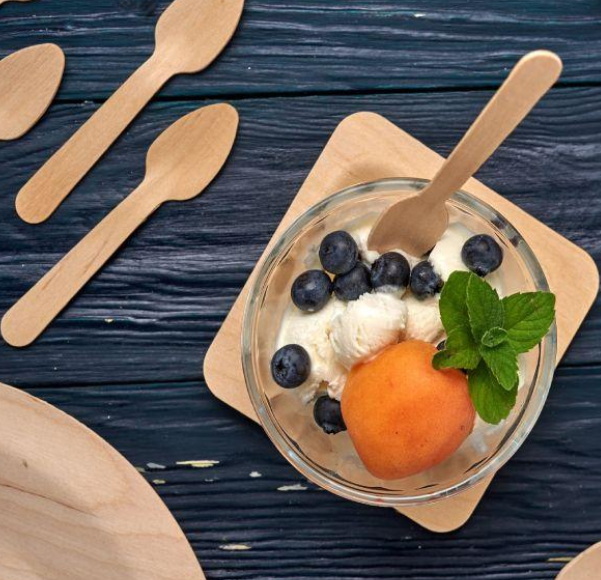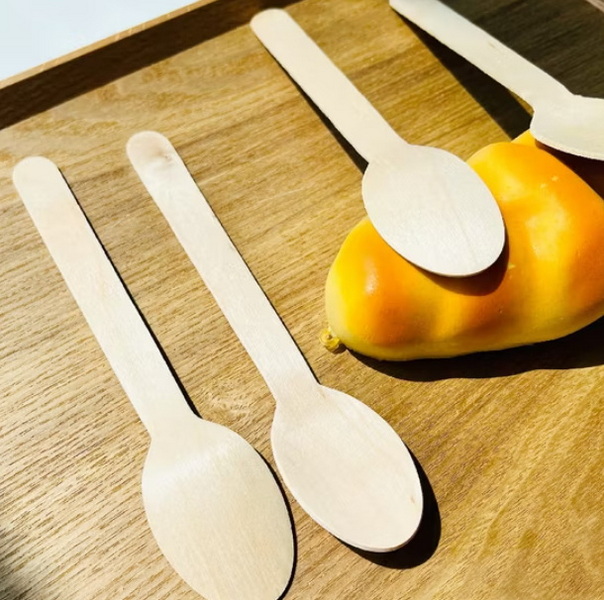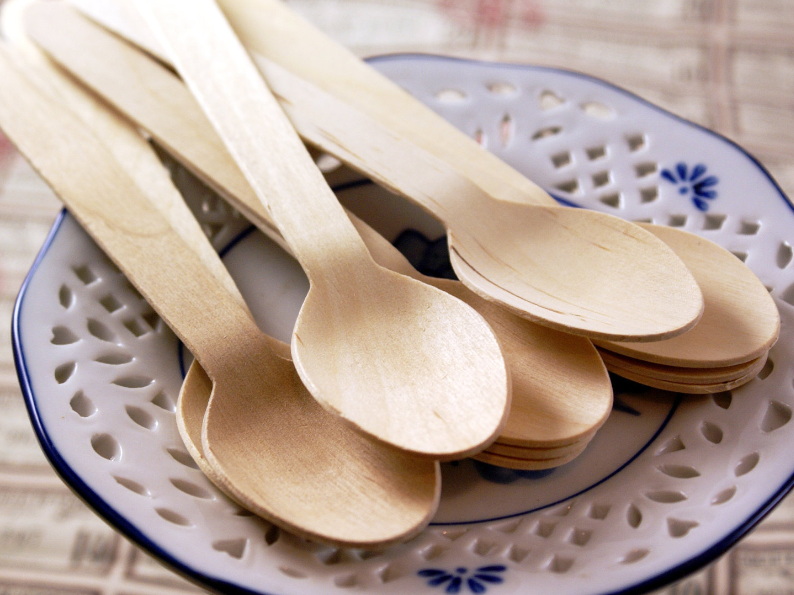
Content Menu
● Advantages of Disposable Bamboo Spoons
>> 1. Eco-Friendly Material
>> 2. Durability and Strength
>> 3. Non-Toxic and Safe
>> 4. Lightweight and Comfortable
>> 5. Aesthetic Appeal
● Environmental Impact: Bamboo vs Plastic
>> 1. Production Process
>> 2. Decomposition
>> 3. Pollution Reduction
>> 4. Circular Economy Potential
● How Are Disposable Bamboo Spoons Made?
● Applications of Disposable Bamboo Spoons
● Global Sustainability Goals: How Bamboo Fits In
● Challenges in Adopting Bamboo Utensils
● Conclusion
● FAQ Section
>> 1. Are disposable bamboo spoons really biodegradable?
>> 2. Can bamboo spoons be reused?
>> 3. Are bamboo spoons safe for hot foods?
>> 4. How should I dispose of used bamboo spoons?
>> 5. Are there any disadvantages to using bamboo cutlery?
● Citations:
In recent years, the global movement toward sustainability has gained significant momentum, and one of the simplest ways to contribute is by switching to eco-friendly alternatives in everyday life. Disposable bamboo spoons have emerged as a popular and effective replacement for plastic utensils. With their environmental benefits, durability, and aesthetic appeal, bamboo spoons are redefining disposable cutlery. This article explores why disposable bamboo spoons are superior to plastic utensils, covering their advantages, manufacturing process, environmental impact, practical applications, and how they align with global sustainability goals.

Advantages of Disposable Bamboo Spoons
1. Eco-Friendly Material
Bamboo is one of the most sustainable materials on Earth. It is a fast-growing grass that regenerates naturally without requiring replanting, pesticides, or fertilizers. Unlike plastic utensils that take hundreds of years to decompose, bamboo spoons are biodegradable and can break down within months to years under composting conditions. This makes them a zero-waste solution for disposable cutlery.
Moreover, bamboo cultivation has minimal environmental impact compared to other materials. It requires less water and energy during its growth cycle, making it an excellent renewable resource for manufacturing.
2. Durability and Strength
Despite being labeled as disposable, bamboo spoons are surprisingly durable. High-quality bamboo spoons can withstand heavy-duty scooping and repeated use without bending or breaking. They are also resistant to heat and moisture, making them suitable for both hot and cold foods.
This durability extends their usability beyond single-use scenarios. If properly cleaned after use, bamboo spoons can serve as temporary reusable utensils for personal use.
3. Non-Toxic and Safe
Bamboo is naturally free from harmful chemicals such as BPA or phthalates found in plastic utensils. This makes bamboo spoons safer for food use, especially when exposed to high temperatures. Additionally, bamboo has antibacterial properties that prevent the growth of bacteria and fungi.
For families with children or individuals with chemical sensitivities, disposable bamboo spoons provide peace of mind as they pose no risk of chemical leaching into food or beverages.
4. Lightweight and Comfortable
Bamboo spoons are lightweight yet sturdy, making them easy to handle and ideal for outdoor events like picnics or camping. Their ergonomic design ensures a comfortable grip while maintaining functionality.
The lightweight nature of bamboo cutlery also makes it convenient for transportation in bulk quantities for catering businesses or large-scale events.
5. Aesthetic Appeal
The natural texture and color of bamboo give these spoons an elegant look that complements any setting, from casual gatherings to upscale events. Their stylish appearance adds a touch of sophistication compared to generic plastic utensils.
Bamboo utensils have even gained popularity in the food photography industry due to their aesthetic appeal. They enhance the visual presentation of dishes while aligning with eco-conscious branding themes.
Environmental Impact: Bamboo vs Plastic
1. Production Process
- Bamboo: The production of bamboo products emits fewer greenhouse gases than plastic manufacturing. Bamboo absorbs five times more CO₂ than trees and produces 35% more oxygen.
- Plastic: Plastic production relies heavily on fossil fuels, contributing to pollution and climate change through greenhouse gas emissions.
2. Decomposition
- Bamboo: Fully biodegradable; decomposes naturally without leaving harmful microplastics.
- Plastic: Takes hundreds of years to decompose, often breaking into microplastics that contaminate ecosystems.
3. Pollution Reduction
Switching from plastic to bamboo reduces the amount of non-biodegradable waste in landfills and oceans. Bamboo utensils help safeguard wildlife from ingesting or becoming entangled in plastic debris.
4. Circular Economy Potential
Disposable bamboo spoons fit well into the circular economy model due to their ability to be composted after use. Composting returns nutrients back into the soil, enabling new plant growth—essentially closing the loop in resource consumption.
How Are Disposable Bamboo Spoons Made?
The manufacturing process of bamboo spoons involves several eco-friendly steps:
1. Harvesting: Bamboo plants are harvested sustainably without destroying their roots.
2. Processing: The harvested bamboo is treated to remove moisture and prevent mold growth.
3. Shaping: Bamboo is cut into spoon shapes using specialized machinery.
4. Finishing: The spoons are polished for smoothness and sometimes coated with natural oils for added durability.
5. Packaging: Eco-friendly packaging materials like recyclable kraft paper are used.
The simplicity of this process highlights how bamboo production minimizes energy consumption compared to plastic manufacturing methods that involve complex chemical processes.
Applications of Disposable Bamboo Spoons
Disposable bamboo spoons are versatile and suitable for various occasions:
- Weddings
- Parties
- Food trucks
- Farmers' markets
- Outdoor picnics
- Catering businesses
Their ability to handle both hot and cold foods makes them an excellent choice for diverse culinary settings.
Additionally, businesses can leverage disposable bamboo cutlery as part of their branding strategy by demonstrating commitment to sustainability—a value increasingly appreciated by consumers worldwide.

Global Sustainability Goals: How Bamboo Fits In
The United Nations Sustainable Development Goals (SDGs) emphasize responsible consumption and production (Goal 12), climate action (Goal 13), and life below water (Goal 14). Disposable bamboo spoons align with these goals by:
- Promoting sustainable resource use through renewable material sourcing.
- Reducing carbon emissions associated with traditional plastic production.
- Preventing marine pollution caused by non-biodegradable plastics.
Governments worldwide are implementing policies against single-use plastics, further driving demand for eco-friendly alternatives like disposable bamboo cutlery.
Challenges in Adopting Bamboo Utensils
While disposable bamboo spoons offer numerous benefits, there are challenges associated with their adoption:
1. Cost: Bamboo utensils may be slightly more expensive than plastic ones due to sustainable harvesting practices.
2. Availability: In some regions, access to affordable bamboo products may be limited.
3. Consumer Awareness: Many consumers remain unaware of the environmental impact of plastic utensils or the advantages of switching to bamboo alternatives.
Addressing these challenges requires collaboration between manufacturers, policymakers, and environmental organizations to increase awareness and accessibility while reducing costs through economies of scale.
Conclusion
Disposable bamboo spoons offer an eco-conscious alternative to plastic utensils without compromising on functionality or style. Their sustainability, durability, safety, aesthetic appeal, and alignment with global sustainability goals make them a superior choice for individuals and businesses alike. By opting for bamboo cutlery, you contribute to reducing plastic waste, lowering carbon footprints, and preserving the planet for future generations.
Switching from plastic utensils may seem like a small change—but collectively, such actions have the power to create a significant positive impact on our environment.

FAQ Section
1. Are disposable bamboo spoons really biodegradable?
Yes, disposable bamboo spoons are 100% biodegradable under proper composting conditions. They typically take 6 months to 3 years to decompose fully depending on the environment.
2. Can bamboo spoons be reused?
While designed for single use, bamboo spoons can be washed gently with warm soapy water for personal reuse if desired.
3. Are bamboo spoons safe for hot foods?
Absolutely! Bamboo has excellent heat resistance and does not release harmful chemicals when exposed to high temperatures like plastic does.
4. How should I dispose of used bamboo spoons?
Dispose of them in a compost bin or bury them in soil where they can biodegrade naturally within months.
5. Are there any disadvantages to using bamboo cutlery?
Bamboo cutlery may crack or deform if exposed to extreme moisture or temperatures over time. Proper care can mitigate these issues.
Citations:
[1] https://www.birchcutlery.com/news/why-choose-bamboo-disposable-utensils-over-pla-80580878.html
[2] https://eventableware.com/bamboo-spoons-the-ultimate-guide/
[3] https://bamboosahihai.com/bamboo-comparison/bamboo-vs-plastic-environmental-impact-compared/
[4] https://holycitystrawcompany.com/products/wrapped-bamboo-spoons-6-7
[5] https://www.youtube.com/watch?v=PmelqyJWUF4
[6] http://pandabode.com/index.php?route=product%2Fproduct&product_id=102
[7] https://www.yanxiyan.com/bamboo-utensils-pros-cons/
[8] https://www.anchenggy.com/blog/why-disposable-bamboo-and-wooden-cutlery-are-better-eco-friendly-choices-made-simple.html
[9] https://www.ecoconcepts.com.hk/bamboo-faq
[10] https://westshorecutlery.com/disposable-wooden-cutlery/
[11] http://www.thbamboo.com.vn/environmental-impact-of-wooden-disposable-spoons-vs-plastic-spoons-a-comprehensive-analysis-342581
[12] https://www.alder-tek.com/sustainability-of-wooden-utensils-the-environmental-benefits/
[13] https://refork.com/news/plastic-cutlery-vs-biodegradable-alternatives/
[14] https://eventableware.com/disposable-wooden-cutlery-reduce-plastic-waste/
[15] https://www.reddit.com/r/ZeroWaste/comments/iye82w/why_bamboo_utensils/
[16] https://www.wildandstone.com/blogs/eco-tips-and-tricks/bamboo-cutlery-guide
[17] https://wonbonwood.com/disposable-wooden-cutlery-preference/
[18] https://at.duni.com/en/magazin/einwegbesteck
[19] https://purpleclay.com/blogs/news/eco-friendly-wooden-disposable-cutlery-forks-spoons-knives
[20] https://plastic-nomore.com/en/bamboo-cutlery-and-others/
[21] https://www.ecobifrost.com/advantages-of-eco-friendly-disposable-bamboo-cutlery-sets/
[22] https://www.shutterstock.com/search/bamboo-spoon
[23] https://www.freepik.com/free-photos-vectors/bamboo-cutlery
[24] https://www.youtube.com/watch?v=YhQNJ9jBMGY
[25] https://www.shutterstock.com/search/disposable-wooden-spoons
[26] https://www.youtube.com/watch?v=ObOnG2ECpMU
[27] https://www.gettyimages.hk/%E5%9C%96%E7%89%87/wooden-forks-and-spoons
[28] https://www.youtube.com/watch?v=f2V4uH2gvlo
[29] https://wonbonwood.com/disposable-wooden-spoons-safety/
[30] https://brandeditems.com.au/product/biodegradable-disposable-bamboo-spoon/
[31] https://www.youtube.com/watch?v=9Ny0lsqGvCQ
[32] https://www.anchenggy.com/blog/must-ask-questions-for-your-disposable-tableware-supplier.html
[33] https://wonbonwood.com/quiz/disposable-wooden-spoons-safety/

















